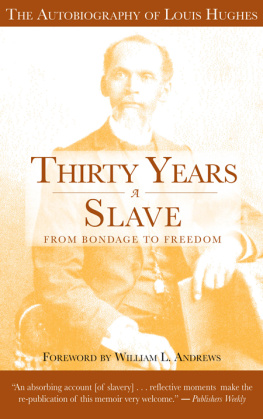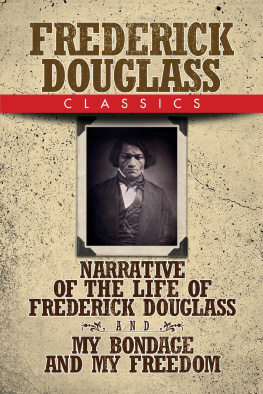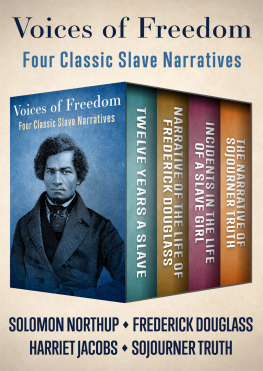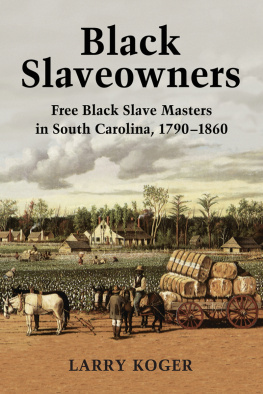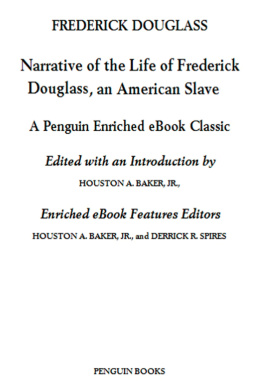Bibliographical Note
Moses Ropers book, under the title A Narrative of the Escape of Moses Roper, from American Slavery, was first published in London by Darton, Harvey and Darton in 1837. Between then and 1856, it went through no fewer than ten editions. The first American publication was by Merrihew & Gunn, Philadelphia, in 1838.
This Dover edition, first published in 2003, is an unabridged republication of Darton, Harvey and Dartons second edition, published in 1838. The text is taken from the facsimile edition published by Negro Universities Press, New York, in 1970.
Library of Congress Cataloging-in-Publication Data
Roper, Moses.
[Narrative of the adventures and escape of Moses Roper from American slavery]
Narrative of my escape from slavery / Moses Roper.
p. cm.
Originally published: A narrative of the adventures and escape of Moses Roper from American slavery. 2nd ed. London : Darton, Harvey, and Darton, 1838.
9780486148687
1. Roper, Moses. 2. SlavesUnited StatesBiography. 3. Fugitive slavesUnited StatesBiography. 4. African AmericansBiography. 5. Racially mixed peopleUnited StatesBiography. 6. SlaverySouth CarolinaHistory. 7. SlavesSouth CarolinaSocial conditionsCase studies. 8. Liberty Hill Region (S.C.)Biography. I. Title.
E444 .R785 2003
305.567092dc21
[B]
2002031544
Manufactured in the United States of America
Dover Publications, Inc., 31 East 2nd Street, Mineola, N.Y. 11501
Advertisement to the SECOND EDITION
The encouragement which the Author of the following Narrative has met with, in the sale of the First Edition, for which he desires to express his sincere gratitude, and the urgent calls which are still made from the provincial towns and in the metropolis, for more copies, have induced him to put forth this Second Edition, by the sale of which, he fully anticipates the realization of his object: namely, to create a fund which may enable him to qualify himself to instruct the heathen, and to acquaint the English reader with some of the evils of the slavery system in America.
The Author cannot omit this opportunity of stating, with a deep feeling of gratitude, that the publication of the first edition of this work has induced a gentleman of Manchester, previously a stranger to him, most generously to send out the pecuniary means for releasing one of his sisters from slavery, who is mentioned in p. 13.
London,
1 st January, 1838.
Preface
The following narrative was to have appeared under the auspices of the Rev. Dr. Morison, of Chelsea, whose generous exertions on behalf of Moses Roper have entitled him to the admiration and gratitude of every philanthropist. But the illness of the doctor having prevented him from reading the manuscript, I have been requested to supply his lack of service. To this request I assent reluctantly, as the narrative would have derived a fuller sanction and wider currency, had circumstances permitted the original purpose to be carried out. Moses Roper was introduced to Dr. Morison, by an eminent American abolitionist, in a letter, dated November 9th, 1835, in which honourable testimony is borne to his general character, and the soundness of his religious profession. He has spent about ten days in my house, says Dr. Morisons correspondent, I have watched him attentively, and have no doubt, that he is an excellent young man, that he possesses uncommon intelligence, sincere piety, and a strong desire to preach the Gospel. He can tell you his own story better than any one else, and I believe, that if he should receive an education, he would be able to counteract the false and wicked misrepresentations of American slavery, which are made in your country by our Priests and Levites who visit you.
Dr. Morison, as might have been anticipated from his well-known character, heartily responded to the appeal of his American correspondent. He sent his letter to the Patriot Newspaper, remarking in his own communication to the Editor, I have seen Moses Roper, the fugitive slave. He comes to this country, as you will perceive, well authenticated as to character and religious standing; and my anxiety is, that the means may forthwith be supplied by some of your generous readers, for placing him in some appropriate seminary for the improvement of his mind, that he may be trained for future usefulness in the church. His thirst for knowledge is great; and he may yet become a most important agent in liberating his country from the curse of slavery.
Moses Roper brought with him to this country several other testimonies, from persons residing in different parts of the States; but it is unnecessary to extend this Preface by quoting them. They all speak the same language, and bear unequivocal witness to his sobriety, intelligence, and honesty.
He is now in the land of freedom, and is earnestly desirous of availing himself of the advantages of his position. His great ambition is to be qualified for usefulness amongst his own people; and the progress he has already made, justifies the belief, that, if the means of education can be secured for a short time longer, he will be eminently qualified to instruct the children of Africa in the truths of the gospel of Christ. He has drawn up the following narrative, partly with the hope of being assisted in this legitimate object, and partly to engage the sympathies of our countrymen on behalf of his oppressed brethren. I trust that he will not be disappointed in either of these expectations, but that all the friends of humanity and religion among us, will cheerfully render him their aid, by promoting the circulation of his volume. Should this be done to the extent that is quite possible, the difficulties now lying in his way will be removed.
Of the narrative itself it is not necessary that I should say much. It is his own production, and carries with it internal evidence of truth. Some of its statements will probably startle those readers who are unacquainted with the details of the slave system; but no such feeling will be produced in any who are conversant with the practice of slavery, whether in America or our own colonies. There is no vice too loathsomeno passion too cruel or remorseless, to be engendered by this horrid system. It brutalizes all who administer it, and seeks to efface the likeness of God, stamped on the brow of its victims. It makes the former class demons, and reduces the latter to the level of brutes.
I could easily adduce from the records of our own slave system, as well as from those of America, several instances of equal atrocity to any which Moses Roper has recorded. But this is unnecessary, and I shall, therefore, merely add, the unqualified expression of my own confidence in the truth of this narrative, and my strong recommendation of it to the patronage of the British Public.
THOMAS PRICE.
HACKNEY, July 22nd, 1837.


